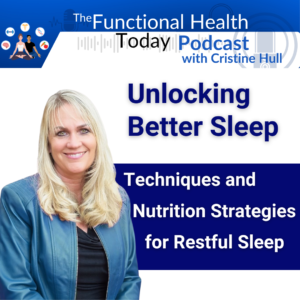What Are High Cortisol Levels?
 Cortisol, commonly known as the “stress hormone,” plays a vital role in regulating various body functions, including metabolism, immune response, and blood sugar levels. However, when cortisol levels remain elevated for extended periods, it can lead to significant health issues, especially for women. High cortisol levels, also called hypercortisolism, can disrupt the body’s balance and create physical, emotional, and hormonal challenges.
Cortisol, commonly known as the “stress hormone,” plays a vital role in regulating various body functions, including metabolism, immune response, and blood sugar levels. However, when cortisol levels remain elevated for extended periods, it can lead to significant health issues, especially for women. High cortisol levels, also called hypercortisolism, can disrupt the body’s balance and create physical, emotional, and hormonal challenges.
KEY POINTS
High cortisol levels, often caused by chronic stress, poor sleep, and certain medical conditions, can disrupt hormone balance, leading to physical, mental, and emotional challenges.
In women, elevated cortisol can cause menstrual irregularities, impact fertility, accelerate aging, and contribute to weight gain, particularly in the abdominal area.
Chronic stress and high cortisol can interfere with sleep, leading to insomnia and other sleep disturbances, especially during menopause.
Effective stress management techniques, regular exercise, proper sleep hygiene, and natural supplements like ashwagandha can help reduce cortisol levels and improve overall well-being.

Pop in your email below, and we’ll zip it straight to your inbox so you never lose it!
What Causes High Cortisol Levels?
Several factors can lead to consistently high cortisol levels:
- Chronic Stress: Persistent stress from work, relationships, or daily pressures triggers excessive cortisol release.
- Poor Sleep: Inadequate or irregular sleep patterns can cause cortisol to spike, particularly during the night.
- Dietary Choices: Excessive caffeine or sugar consumption can stimulate cortisol production.
- Medical Conditions: Disorders such as Cushing’s syndrome, thyroid dysfunction, or adrenal gland issues are common medical causes of high cortisol.
- Medications: Prolonged use of corticosteroids can artificially elevate cortisol levels.
Looking to take control of your weight & nutrition?

How Do High Cortisol Levels Affect Women?
Women are particularly susceptible to the effects of high cortisol due to the interplay between cortisol and reproductive hormones. Elevated cortisol can:
- Disrupt Menstrual Cycles: Cortisol imbalances can suppress ovulation and cause irregular or missed periods.
- Impact Fertility: Prolonged high cortisol may affect reproductive health by interfering with hormone regulation.
- Accelerate Aging: Chronic cortisol elevation can lead to collagen breakdown, causing premature aging of the skin.
- Influence Weight Gain: Women with high cortisol often experience fat accumulation, particularly around the abdominal area.
What Are the Symptoms of High Cortisol?
High cortisol levels manifest in various ways, impacting both the body and mind:
- Physical Symptoms: Weight gain, especially in the abdomen, fatigue, muscle weakness, and a weakened immune system.
- Mental Health: Increased anxiety, depression, irritability, and difficulty concentrating.
- Sleep Disruption: Trouble falling or staying asleep due to elevated nighttime cortisol.
- Skin Changes: Acne, thinning skin, and delayed wound healing.
- Hormonal Issues: Symptoms like hair thinning, low libido, or exacerbated PMS symptoms may occur.
Understanding and addressing high cortisol levels is crucial for maintaining overall health and well-being. Identifying the causes and symptoms early can help women take proactive steps, such as managing stress, improving sleep habits, and seeking medical advice when necessary, to restore hormonal balance and prevent long-term complications.
How Does Chronic Stress Impact Cortisol Levels?
Chronic stress leads to high levels of cortisol, as the body’s stress response activates the pituitary gland to release ACTH, prompting the adrenal glands to produce cortisol, a steroid hormone. This rising cortisol can result in high blood pressure, insomnia, and other health issues.
Over time, cortisol levels in women may remain unnaturally high during the menopausal transition and early postmenopause, affecting their circadian rhythm. While cortisol plays a role in the body’s ability to reduce inflammation, chronic high cortisol can ultimately lead to decreased health and lower cortisol levels when stressors are removed.
Moreover, the interplay of cortisol and adrenaline intensifies the body’s response to stress, creating a cycle where stress levels remain elevated and cortisol levels rise significantly. Managing stress effectively can help reduce stress and allow levels return to normal, fostering overall well-being.
Signs and Symptoms of High Cortisol Levels
What Are Common Signs of High Cortisol?
 Common signs of high cortisol include weight gain, fatigue, and low sex drive, particularly in menopausal women. During the menopausal transition, women may experience excess cortisol due to hormonal changes and increased stress. Cortisol is a steroid hormone produced by the adrenal glands, and its levels can fluctuate greatly over time.
Common signs of high cortisol include weight gain, fatigue, and low sex drive, particularly in menopausal women. During the menopausal transition, women may experience excess cortisol due to hormonal changes and increased stress. Cortisol is a steroid hormone produced by the adrenal glands, and its levels can fluctuate greatly over time.
When stress and cortisol levels rise, the body may release cortisol in response to perceived threats, leading to unnaturally high cortisol levels and the production of adrenaline and cortisol. Studies, such as the Seattle Midlife Women’s Health Study, have shown that higher cortisol levels can lead to various health issues, including anxiety and a low sex drive. Consequently, producing too much cortisol can significantly affect overall well-being.
How Do High Cortisol Levels Affect Sleep?
Cortisol, often referred to as the “stress hormone”, is produced during times of stress, alongside epinephrine. During the menopausal transition, cortisol levels can fluctuate, which impacts sleep. Cortisol dysfunction may lead to elevated levels that are associated with elevated cortisol and can significantly disrupt sleep patterns.
As cortisol helps regulate various physiological functions, cortisol can affect daily hormone levels, particularly in women experiencing menopause. The body may produce more cortisol due to daily stress, which over time affects overall well-being. Corticotropin-releasing hormone and adrenocorticotropic hormone also play roles in this complex relationship.
Steps you can take to manage cortisol levels over time include stress reduction techniques, regular exercise, and maintaining a healthy sleep routine. Understanding how cortisol affects sleep can empower individuals to improve their health during this transitional phase.
How to Reduce High Cortisol Levels
High cortisol levels during the menopausal transition can significantly impact health. Cortisol is produced by the adrenal glands as part of the body’s response to stress, often referred to as the “stress hormone.” Elevated cortisol levels during the menopausal transition can lead to various issues, including weight gain and mood swings.
To manage these levels, effective stress management techniques are crucial. Practices such as meditation and yoga can help lower cortisol’s effects. Additionally, incorporating ashwagandha root extract may assist in reducing stress responses. Research indicates that cortisol can lead to adverse health effects, making it essential to find ways to regulate your blood pressure and overall well-being.
It’s important to recognize that cortisol’s patterns are tightly linked to sleep; levels are typically lowest between midnight and early morning. A prospective study showed that maintaining a regular sleep schedule can help mitigate stress and keep cortisol in check, aiding in a healthier menopause experience.
In summary, understanding how cortisol functions in the body, particularly from one of the adrenal glands, and utilizing natural supplements like ashwagandha root extract can provide effective strategies for managing high cortisol levels during the menopausal phase.
If you want to learn more about cortisol and its impact on your body, check out this comprehensive guide.











